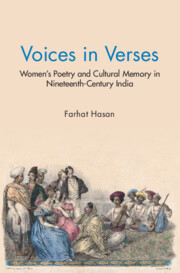Book contents
- Frontmatter
- Dedication
- Contents
- Acknowledgements
- A Note on Transliteration
- List of Abbreviations
- 1 Introduction
- 2 Unravelling the Texts: Memory, Reforms, and Literary Sulh-i-Kul
- 3 Representing an Inclusive Literary Culture: Women Poets in the Bazaars and Kothas
- 4 Representing the Kothas: The Two Sisters in the Literary Sphere
- 5 Commemorating Women Poets: Memory, Gender, and the Literary Culture in the Persianate World
- 6 Secluded Poets in Literary Spaces: Memorializing Female Rulers, Consorts, and Memsahibs
- 7 Conclusion
- Glossary
- Bibliography
- Index
5 - Commemorating Women Poets: Memory, Gender, and the Literary Culture in the Persianate World
Published online by Cambridge University Press: 06 March 2024
- Frontmatter
- Dedication
- Contents
- Acknowledgements
- A Note on Transliteration
- List of Abbreviations
- 1 Introduction
- 2 Unravelling the Texts: Memory, Reforms, and Literary Sulh-i-Kul
- 3 Representing an Inclusive Literary Culture: Women Poets in the Bazaars and Kothas
- 4 Representing the Kothas: The Two Sisters in the Literary Sphere
- 5 Commemorating Women Poets: Memory, Gender, and the Literary Culture in the Persianate World
- 6 Secluded Poets in Literary Spaces: Memorializing Female Rulers, Consorts, and Memsahibs
- 7 Conclusion
- Glossary
- Bibliography
- Index
Summary
In recreating women's literary spaces, the tazkiras not only mention the poets of their time but also refer, in interesting details, to the life stories and lyrical compositions of women poets from the historical and imagined pasts. In the process of commemorating them, these texts portray them as exemplars in terms of their literary skills and aesthetic qualities for the littérateurs of their generation. As commemorative texts, both BN and TN memorialize their literary precursors, but, in the process of doing so, they remind us of the historical presence of an inclusive literary space in which were ensconced memories of lyrics allegedly composed by women. The poets from the multiple pasts claimed an undying existence, an enduring and ever-inspiring presence, in the literary public sphere. It should be emphasized here that even as these tazkiras are exclusively concerned with women poets, the literary community they seek to reproduce and represent is not gender-specific; the community of women poets, writing and reciting poems in Persian and Urdu, did not constitute an exclusive social group, but were seen as a crucial component of the larger Persianate literary culture. In fact, the overwhelming interest of Ranj and Nadir in publishing their compendia was to draw the attention of the reader to the significance of women literati in shaping the norms of aesthetics and appropriate expression in art and literature.
Tazkiras as Commemorative Exercises: Memorializing Women and Their Words
In the last several decades, there have been quite a few insightful studies on the tradition of biographical commemoration in the Persianate world, and scholars have looked at the complex ways through which remembrance – repeated and constructed – served to structure a moral community, and circulating within networks of communication, reinforced ethical norms and appropriate practices. It is for this reason that some scholars have described the tazkiras as ‘memorative communications’ wherein memories were restructured by forms of communication and vice versa. The appropriate ethical norms and behaviour, and aesthetic tastes and expression constituted the Persianate adāb (singular: adab), which were reiterated and reformulated in and through the remembrance of the lives and work of exceptional persons.
- Type
- Chapter
- Information
- Voices in VersesWomen's Poetry and Cultural Memory in Nineteenth-Century India, pp. 118 - 153Publisher: Cambridge University PressPrint publication year: 2024

